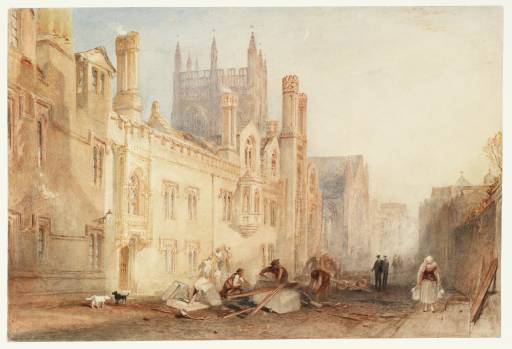Daily Office: Wednesday
¶ Matins: Ms NOLA was kind enough to slip me a link to Leon Wieseltier’s magisterial call to brawn, yet another mandarin voice urging liberals to sock it to ’em. If only we knew how! — even as we digest Mr Wieseltier’s fine talk (and it is fine!) of “the teleological suspension of the ethical.” Who knew that the thickest plank in the Republican Party platform had such a fancy name?
“You remember the teleological suspension of the ethical,” Mr Wieseltier writes with absurd optimism. Happily, he does not count upon the strength of our recollections.
¶ Lauds: Although I’m not sure that I’d like to sit through The Fly — now it’s an opera, with music by Howard Shore (Silence of the Lambs) and book by David Henry Hwang (M Butterfly) — I’d sure like to hear it.
¶ Tierce: While Americans struggle to deal with a resurgent but definitely post-Soviet Russia, separatists within Russia take heart from the formal recognition of new breakaway states in the Caucasus. The interesting thing about Ellen Barry’s story is the refrain of “20 years from now.” Nobody’s talking about anything’s happening tomorrow. Instead, the talk is of death warrants and planted seeds.Â
“In the long term, they could have signed their own death warrant,†said Lawrence Scott Sheets, the Caucasus program director for the International Crisis Group, an independent organization that tries to prevent and resolve global conflicts. “It’s an abstraction now, but 20 years down the road, it won’t be such an abstraction.â€
Mr Sheets is speaking of Russia.
¶ Nones: If JMW Turner’s watercolor of Merton College, Oxford goes missing, I will insist that I know nothing about it. Having just paid my nth visit to the Turner show at the Museum — easily the sixth, I think — I’m beginning to fall in love with a few paintings just as they’re about to wrenched away, but I fell for the Merton watercolor the moment I saw it. Why?
¶ Compline: Thomas P Campbell, a 46 year-old curator of tapestries, will become the ninth director of the Metropolitan Museum of Art at the start of the New Year. As a card-carrying Old Fart, I’m happier with Mr Campbell than I would have been with Gary Tinterow, the strong and clever curator of — you have to love this tripartition — 19th Century, modern, and contemporary art.
Oremus…
§ Matins. He tells us what it is.
It is the recognition that, whereas there is morality in religion, religion is not the same as morality, and may justify an exemption from morality. I know of no religion in which this handy power of extenuation is not used. The telos, in the case of Bristol Palin, is life; and a fine telos it is.
§ Lauds. There’s a note of veiled tendentiousness about Anthony Tommasini’s somewhat dismissive review (these music critics can be ferocious, if undercover, Stalinists):
The most exasperating stretches of the score come when Mr. Shore is most somber. Wandering vocal lines intertwine with every-which-way instrumental lines that skirt tonality, while sustained orchestral harmonies provide a static support. With hints of 12-tone rows and Bergian richness, the music shows signs of Mr. Shore’s craft in almost every measure. But it never adds up. It’s as if Mr. Shore had abandoned his cinematic imagination to write a dutifully contemporary opera.
I wonder what that sounds like.
§ Tierce. Meanwhile, Russia is planting the seeds of its own death warrant in a more familiar way, by smoking a lot.
The average life expectancy of male Russians hovers around 60, and health analysts say the heavy rate of smoking here plays a big role in a looming population drop that has economists here quite worried.
§ Nones. Partly because, like so many of the watercolors in the same room, it’s a cliché and yet more than a cliché. There is nothing to trip up the inattentive mind, to make the consumer whose only interest is decoration want to scratch an itch. It is also a picture of “old Oxford” that is itself nearly two hundred years old.
Finally, I wish I were there. Not there now. It would be interesting to stand there now, on Merton Street looking west, comparing Turner’s image with the view before me. But no. I wish I were some swaggering Whig heir, the Marquess of Hewsitt, circa 1830, scandalizing my family by pursuing a first in earnest. (Listen, I’d settle for being someone who knew whether “pursuing a first” is something that people say.)
But enough about me. The Turner show closes on Sunday week, so hurry. You’ll probably find the Museum as I did this morning — rather empty. I promise not to steal anything before then.
§ Compline. Mr Campbell is said to be a suave diplomat, which he manifestly must have been in order to coax priceless tapestries out of European storerooms for two huge shows earlier this decade. Mr Tinterow, in contrast, is said to have “strained relationships with some powerful board members and senior curators.” Ixnay to that!
I have spent almost all of my adult life in a town over whose major museum Philippe de Montebello presided (Houston and New York), and the prospect of his retirement is almost bewildering.Â
Reporter Carol Vogel appears to have forgotten about the Cloisters:
Unlike the Louvre or the Guggenheim, the Met has given no indication that it would consider opening satellite branches.
I do have a suggestion for Mr Campbell: When the second satellite is built, make it Egyptian. Â


